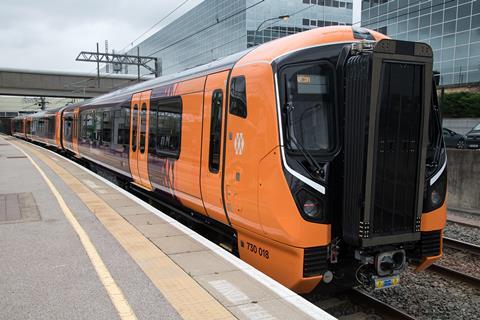
UK: West Midlands Trains has been showing its newly delivered Class 730 EMUs to stakeholders ahead of the expected introduction to service on London Northwestern Railway and West Midlands Railway-branded services later this year.
Being built by Alstom at its Derby factory, the 25 kV 50 Hz EMUs from the Aventra family were originally due to begin carrying passengers from the May 2020 timetable change.
They were ordered from Bombardier Transportation before its purchase by Alstom, and are now being tested and deployed on driver training duties following a series of production delays.
According to senior managers at Alstom, the hold-ups were largely caused by the high volume of trains the factory has produced over the past few years, allied with a significant rectification works being undertaken on newly built vehicles. The remedial works programme has in turn delayed the completion of new rolling stock; Alstom paused all new build work for a period in 2022 to ensure the quality of finished products could be improved.
Fleet changes
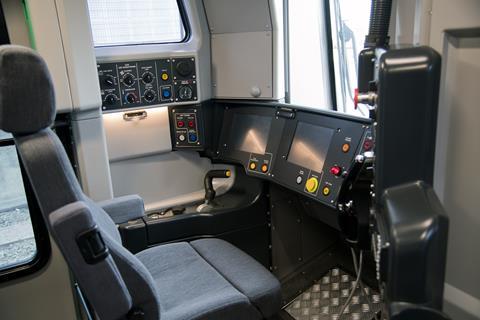
West Midlands Trains originally ordered three sub-fleets of Class 730s for its two business units, LNR and WMR. This was to include a mix of three- and five-car trains, with the batch featuring two interior designs, one high-density arrangement for commuter services and a medium-distance layout with 2+2 seating and a first-class area.
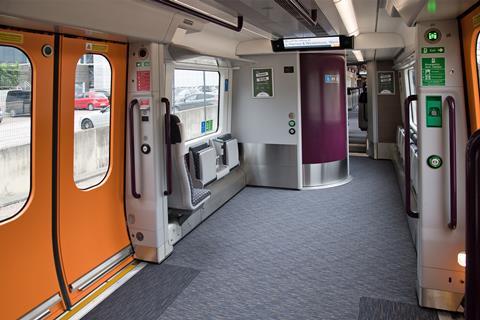
Following an evaluation of service provision to reflect post-Covid travel patterns, the order has subsequently been simplified to comprise 48 high-density Class 730/0 three-car EMUs for 145 km/h operation with 2+2 seating and WMR branding, and 36 medium-distance Class 730/1 EMUs in LNR livery. These five-car, 175 km/h EMUs also have 2+2 seating for 406 passengers but feature less standing room than the WMR variant.
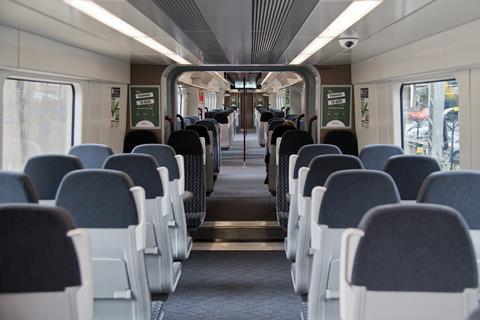
The final order is for nine fewer vehicles than originally planned. The LNR long-distance sets had been specified with first class, albeit with 2+2 seating, but WMT ceased designating first class in May, and the Class 730/1s are not being fitted out for it, giving more seats per five-car train. The high-density WMR trains do still include a small number of four-seat table bays, which the operator says are popular with families in particular.
As well as end gangways for multiple working, the Class 730s have a walk-through interior to give visibility along the length of the train. Compared to the current fleet of Class 323 and 350 EMUs used across the WMT network, the Aventras will have more bike storage space, at least one accessible toilet on every train, transparent luggage racks to minimise lost property issues, improved digital information screens, plug and USB sockets at every seat, and underfloor heating with ‘intelligent’ air-conditioning that reacts to the onboard environment.
Class 319s to go
The three-car Class 730/0 subfleet is being built first, with 25 already having been accepted by WMT and the remainder now in the later stages of assembly.
However, WMT will soon need to replace its small fleet of ex-BR Class 319 EMUs which operate on peak-hour services out of London Euston to avoid the cost of C6 overhauls for these 35-year old dual-system EMUs. As a result, WMT is to temporarily replace them with three-car Class 730s in the orange WMR colours; two 319s were taken out of traffic at the end of June leaving seven still in traffic.
The first Class 730/0 sets are expected to begin carrying passengers in the autumn, but driver training is being impacted by the ongoing industrial dispute with ASLEF. WMT therefore cannot give a firm date for their introduction.
Aside from the peak-hour London Euston diagrams, the first wholesale deployment of the Class 730s will be on the Birmingham Cross-City line. Their introduction will allow some Class 323s to be transferred to Northern Trains, where they will also displace Class 319s. Of WMT’s 26-strong fleet of 323s, 17 are currently being sub-leased back from Northern.
Soho investment
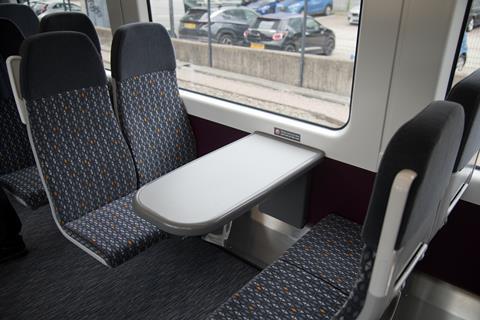
The WMR Class 730s will be based at Soho depot in Birmingham where a significant package of preparatory work is underway to ensure the facility is ready to accept them. The Class 730s have more key components located in the roof space than the Class 323s, necessitating investment in cranes and raise platforms in the workshop.
Soho’s EMU allocation will also grow from 26 trains today to 48, which has led WMT and Network Rail to enhance the depot’s electrical power supply. This will now be independent of the OLE for the adjacent Birmingham – Wolverhampton main line. WMT is also to invest in stabling points at Coventry and Bescot as part of the fleet’s introduction.
The LNR Class 730/1 fleet for WCML services is to be based at Bletchley, where the depot building is being extended and roof access installed. Alstom has a maintenance agreement under which its personnel will carry out most of the servicing tasks, but routine activities including tyre turning will continue to be carried out by WMT staff.
More capacity on some routes
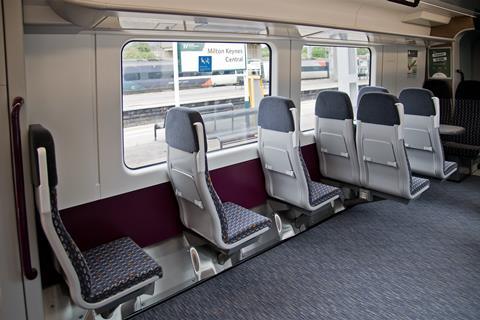
In terms of network throughput, WMT says that a pair of three-car Class 730/0 sets has greater capacity than a pair of four-car 319s, when standing space is included. On WCML services, pairs of five-car Class 730/1s will replace 12-car Class 350 formations; WMT points out that both are 240 m long trains but the 730s have less space dedicated to cabs and gangway connections.
The Birmingham Cross-City service between Redditch and Lichfield meanwhile will move to six-car Class 730/0 formations running initially four times per hour, but the 48-strong fleet could cover any future uplift to six trains/h should demand warrant it.
The five-car 730/1s are earmarked to take over from Class 350s the Birmingham – Liverpool service, which has been hourly since the pandemic. However, a possible return to the 30 min headways of 2019 is being evaluated; this could be facilitated if five-car 730/1s replace the current eight-car Siemens Desiro formations. An hourly service using pairs of Class 730s could be challenging because this would require the use of selective door opening at multiple intermediate stations on the route.
- WMT has confirmed that the three two-car Class 230 diesel-battery trains which worked on the Marston Vale line until the liquidation of Vivarail earlier this year will be transferred to Great Western Railway in mid-July. A full timetable on the Bedford – Bletchley line is expected to be reintroduced from December using Class 150 DMUs subleased from Northern Trains.



